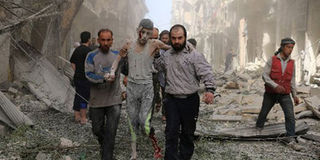160 killed in IS attack in heartland of Syrian regime

Syrians help a wounded youth following an air strike in the northern Syrian city of Aleppo on April 26, 2016. PHOTO | AFP | AMEER ALHALBI
What you need to know:
- Seven near-simultaneous blasts target bus stations, hospitals and other public places in the seaside cities of Jableh and Tartus.
DAMASCUS, Tuesday
More than 160 people have been killed in bombings claimed by the Islamic State group in northwestern Syria, the deadliest attacks to date in the regime’s coastal heartland.
Seven near-simultaneous explosions on Monday targeted bus stations, hospitals and other civilian sites in the seaside cities of Jableh and Tartus, which until now had been relatively insulated from Syria’s five-year war.
The attacks on strongholds of President Bashar al-Assad’s regime came as IS faces mounting pressure in Syria and neighbouring Iraq, where a major offensive to retake the jihadist-held city of Fallujah is underway.
More than 100 people were killed in Jableh and another 48 in Tartus, to the south, including children, said the Syrian Observatory for Human Rights monitor.
Observatory head Rami Abdel Rahman said they were “without a doubt the deadliest attacks” on the two cities since the start of the war.
IN RETALIATION
IS claimed the blasts in a statement, saying they were in retaliation for Syrian regime and Russian air strikes against the jihadists and vowed to carry out “more devastating and bitter attacks”.
IS is not known to have a presence in Syria’s coastal provinces, where its jihadist rival, Al-Qaeda-affiliated Al-Nusra Front, is much more prominent.
But IS, notorious for using deadly sleeper cells to attack its enemies, suggested the creation of a “wilayat al-Sahel” or Islamic province for the coastal area.
“I’m shocked, this is the first time I heard sounds like these,” said Mohsen Zayyoud, a 22-year-old student in Jableh.
In Tartus a 42-year-old bank employee was just as stunned.
“It’s the first time we hear explosions in Tartus, and the first time we see dead people or body parts here,” said Shady Osman.
On Tuesday, Washington and Moscow were scrambling to salvage Syria’s shaky ceasefire as the country reeled from jthe bombings.
The US envoy for Syria late Monday urged rebels to respect the February 27 ceasefire after they gave its brokers—Washington and Moscow—until Tuesday afternoon to stop the advance on rebel bastions outside Damascus.
“We recognise that the CoH (Cessation of Hostilities) is under severe stress, but believe that to abandon it now would be strategic error,” Michael Ratney said in a statement on Twitter. “If the armed factions abandoned the CoH, Assad and his supporters would claim this gives them licence to attack all the opposition forces without international objection.”
Twenty-nine rebel groups had called on Washington and Moscow to force the regime “to completely and immediately halt it offensive against Daraya and Eastern Ghouta” near Damascus.





